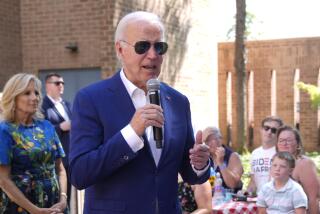Fight Drugs With Volunteers, Bush Tells Mayors
- Share via
WASHINGTON — President Bush told the nation’s mayors Friday they should rely more on volunteer efforts to fight illegal drugs in their cities and pledged to use the White House as “a bully pulpit” to activate citizens in the effort.
While agreeing on the value of voluntary action, the mayors responded that it is no substitute for government money and renewed their criticism of the Administration’s newly released drug war blueprint.
Bush earned some good will from the mayors by becoming the first President in a decade to address the U.S. Conference of Mayors meeting, but his drug plan has drawn mostly negative reviews from the men and women who run the cities.
Citing surveys showing Americans’ willingness to contribute time or money to combat drugs in their neighborhoods, Bush said: “They want to serve. They want to give. But they have to be asked before they can do either. I promise, I will use the bully pulpit to ask them to do both, and I urge you to do the same thing.”
Asked about Bush’s emphasis on his “1,000 points of light” approach, Houston Mayor Kathy Whitmire, a Democrat, said: “I happen to be an advocate of voluntarism. I feel it is a successful approach. It is not, however, a replacement for government.”
The mayors criticized Bush’s latest drug strategy, which calls for $10.6 billion in spending, as inadequate given the problem they are confronting at home.
In his speech, Bush also emphasized tougher law enforcement and asked the mayors to support his plan to expand the death penalty for certain drug-related crimes. The mayors, taking no position on capital punishment, said they want substantially more money for law enforcement and want the money funneled directly to the cities, claiming cities received only 15% of the federal enforcement funds last year.
Boston Mayor Raymond L. Flynn, a Democrat, praised the President for appearing but said the mayors have a “sharp disagreement” with the Administration on its approach to cities, not only in the drug fight but also in providing adequate housing for the poor and the homeless.
More to Read
Sign up for Essential California
The most important California stories and recommendations in your inbox every morning.
You may occasionally receive promotional content from the Los Angeles Times.










